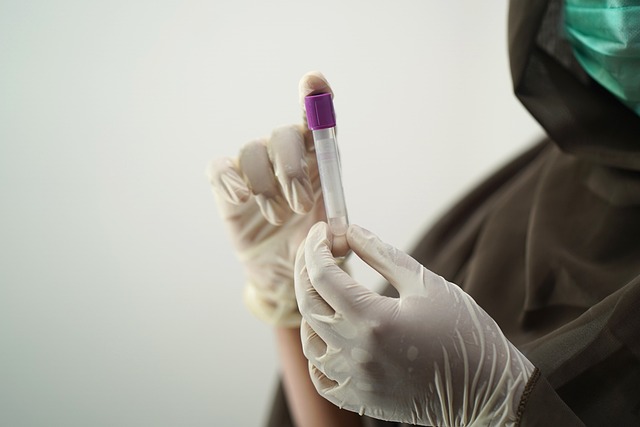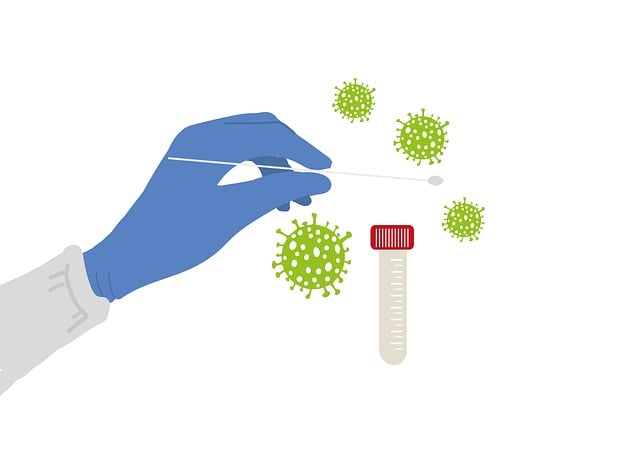The UK Standard Thyroid Blood Test is an essential diagnostic tool that provides a comprehensive analysis of thyroid function, which plays a crucial role in reproductive health. This test accurately measures TSH, T4, and T3 hormone levels to evaluate thyroid activity and diagnose conditions like hypothyroidism or hyperthyroidism that can cause menstrual irregularities and fertility issues. It is vital for early detection and management of these disorders to optimize treatment outcomes and support successful conception and healthy pregnancies. The test's results enable healthcare professionals to tailor treatments based on individual patient needs, enhancing the likelihood of conception success by monitoring hormone levels and interventions effectively. The UK Standard Thyroid Blood Test is integral for a holistic approach to reproductive health, offering precise diagnoses and targeted therapies that are essential for addressing infertility and other reproductive disorders. Its standardization across the UK ensures reliable and consistent results, aiding in longitudinal comparisons and treatment management between different clinics.
navigating the complexities of reproductive health often hinges on a nuanced understanding of hormonal balances. This article delves into the pivotal role of hormone analysis, particularly highlighting the UK Standard Thyroid Blood Test’s significance in diagnosing and treating reproductive disorders. We explore how comprehensive hormone profiling can enhance fertility outcomes and contribute to successful conception. Join us as we unravel the intricate relationship between endocrine function and reproductive health, empowering individuals with knowledge for better health management.
- Understanding the UK Standard Thyroid Blood Test and Its Role in Reproductive Health
- Hormone Analysis: A Comprehensive Approach to Diagnosing and Treating Reproductive Disorders
- Navigating Fertility Challenges: The Importance of Hormone Profiling for Conception Success
Understanding the UK Standard Thyroid Blood Test and Its Role in Reproductive Health

The UK Standard Thyroid Blood Test plays a pivotal role in assessing thyroid function, which is integral to reproductive health. This comprehensive test measures levels of thyroid-stimulating hormone (TSH), thyroxine (T4), and triiodothyronine (T3), providing a thorough evaluation of thyroid activity. In women, thyroid dysfunction can significantly impact fertility and pregnancy outcomes. Elevated or low levels of thyroid hormones can disrupt ovulation, leading to menstrual irregularities or difficulty in conceiving. Consequently, identifying and managing thyroid disorders with the UK Standard Thyroid Blood Test is essential for those experiencing reproductive issues. This test not only aids in diagnosing hypothyroidism or hyperthyroidism but also helps monitor the effectiveness of hormone replacement therapy or other treatments, ensuring that thyroid levels are within the optimal range for conception and maintaining a healthy pregnancy. Understanding the results of this test enables healthcare providers to tailor treatments that support the reproductive processes, thereby improving the chances of successful conception and pregnancy maintenance for affected individuals.
Hormone Analysis: A Comprehensive Approach to Diagnosing and Treating Reproductive Disorders

Hormone analysis plays a pivotal role in the diagnosis and treatment of reproductive disorders, offering a window into the intricate workings of the endocrine system. In the UK, the Standard Thyroid Blood Test is an integral component of this analytical process, providing healthcare professionals with a clear picture of thyroid hormone levels, which are critical for reproductive health. This test measures the levels of thyroxine (T4) and triiodothyronine (T3), along with thyroid-stimulating hormone (TSH), to assess thyroid function. Reproductive issues such as infertility, irregular menstrual cycles, or recurrent miscarriages can often be traced back to imbalances in these hormones. By identifying such discrepancies, healthcare providers can tailor treatments specifically to each patient’s unique hormonal profile, improving the chances of conception and maintaining a healthy pregnancy. The UK Standard Thyroid Blood Test is not just a diagnostic tool but also a guide for ongoing treatment management, ensuring that patients receive the most effective and individualized care possible.
Furthermore, the integration of the UK Standard Thyroid Blood Test within the broader scope of hormone analysis is indicative of a holistic approach to reproductive health. It complements other diagnostic procedures, such as ovarian reserve testing and tests for polycystic ovary syndrome (PCOS), providing a more comprehensive understanding of a patient’s hormonal status. This comprehensive approach allows for more accurate diagnoses, leading to targeted treatments that can significantly enhance the effectiveness of fertility interventions. The test’s availability and standardization across the UK also facilitate easier comparisons over time and between different clinics, ensuring consistency and reliability in patient care. As such, hormone analysis, with the UK Standard Thyroid Blood Test at its core, is an indispensable tool for healthcare professionals addressing reproductive disorders.
Navigating Fertility Challenges: The Importance of Hormone Profiling for Conception Success

Individuals facing fertility challenges often seek comprehensive assessments to understand and address the underlying causes of their difficulties in conceiving. Hormone profiling emerges as a pivotal diagnostic tool, offering insights into the intricate hormonal balances that govern reproductive health. A key component of this evaluation is the UK Standard Thyroid Blood Test, which measures levels of thyroid-stimulating hormone (TSH), triiodothyronine (T3), and thyroxine (T4). Thyroid dysfunction can significantly impact fertility, and its detection through this test enables timely intervention. Beyond the thyroid, a detailed hormonal analysis includes evaluations of follicle-stimulating hormone (FSH) and luteinizing hormone (LH), along with estrogen and progesterone levels, which are essential for ovulation and maintaining a healthy reproductive cycle. This holistic approach to hormone profiling can identify imbalances that may be hindering conception efforts, allowing healthcare providers to tailor treatments specifically to the individual’s needs. Incorporating the UK Standard Thyroid Blood Test within this broader hormonal assessment is crucial for pinpointing thyroid-related issues that could otherwise complicate the path to successful conception. By addressing these hormonal imbalances, individuals have a significantly improved chance of overcoming fertility challenges and achieving their reproductive goals.
In conclusion, hormone analysis emerges as a pivotal tool in addressing reproductive health concerns, particularly within the context of the UK Standard Thyroid Blood Test. The comprehensive approach outlined in this article underscores the significance of accurate hormone profiling for diagnosing and treating reproductive disorders. For those navigating fertility challenges, such detailed assessments are instrumental in optimising conception success rates. Understanding the nuances of thyroid function through the UK Standard Thyroid Blood Test can lead to more informed medical decisions, ultimately contributing to improved reproductive outcomes. This article highlights the critical nature of hormone analysis in the realm of reproductive health and emphasizes its role as a key diagnostic element for healthcare providers and patients alike.
